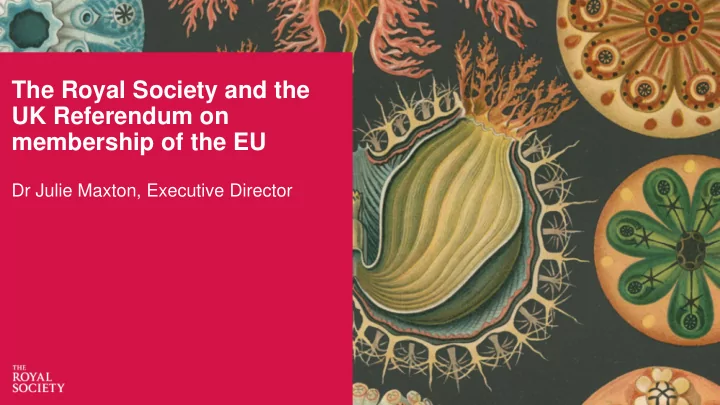

The Royal Society and the UK Referendum on membership of the EU Dr Julie Maxton, Executive Director
Today’s presentation • The Royal Society’s role • Key developments for science and research following the EU referendum • Working together going forward
The Royal Society • UK national academy of science. • Founded in 1660, fundamental purpose is to recognise, promote, and support excellence in science and to encourage the development and use of science for the benefit of humanity. • Self-governing Fellowship of distinguished scientists from all areas of science, engineering, and medicine. • Dedicated to promoting excellence in science • Established international networks, across Europe, Commonwealth, G7 and G20
Academy networks
Academy networks
The Royal Society
Work before the Three reports: What role does the EU play in UK science? Referendum • Funding • Collaboration and Mobility • Regulation More information: https://royalsociety.org/topics-policy/projects/uk-research-and- european-union/
Work since the • EU Contact group of Fellows Referendum • UK national academies statement following the referendum • European academies statement “Science Is Global” • “ Open for Business ”
Work since the • Responding to Parliamentary inquiries on science and the EU and Referendum Britain’s place in the world • Engaging with new DExEU and DIT and their Ministers, e.g. David Davis • Seminar with Stephen Metcalfe MP • Meetings with Members of Parliament • Planned meeting with MEPs on European research • Participation in Science Minister Jo Johnson’s High Level stakeholder working group on EU exit, universities, research and innovation • Engaging the ‘networks of networks’ of the UK science community
Work since the • Gathering evidence on international researcher mobility, funding, Referendum facilities and infrastructure and future scenarios. • International engagement: • visits to China, Japan, USA, South Korea • roundtable with UK and German scientists • upcoming visits to the Netherlands, France and Belgium
Prime Minister’s 12 1. Certainty wherever possible Objectives 2. Control of our own laws 3. Strengthening the United Kingdom 4. Maintaining the common travel area with Ireland 5. Control of immigration 6. Rights for EU nationals in Britain and British nationals in the EU 7. Enhancing rights for workers 8. Free trade with European markets 9. New trade agreements with other countries 10. A leading role in science and innovation 11. Co-operation on crime, terrorism and foreign affairs 12. A phased approach, delivering a smooth, orderly Brexit
Successes • Treasury underwriting of grants • Increased investment in science
Joint Statement with academies across the EU
Royal Society • The international nature of research will not change. We remain positions committed to working with our counterparts in the EU and the rest of the world and hope that the UK will strengthen the ability of its researchers to do so. • Throughout the upcoming process, science will need a strong, unified voice to represent its interests across government, Europe and around the world. • EEA nationals already in the UK, and their families, who are already working in the UK should be assured that they’ll be able to stay • While the UK continues to be a Member State, UK researchers should be able to collaborate with European colleagues and participate fully in EU research programmes.
Royal Society • The UK should seek the closest possible association with EU positions research programmes. • The Government should take the opportunity to explore how the wider, global immigration system could be streamlined. The immigration system must support the UK’s aim to be one of the best places in the world to research and innovate; • Researcher mobility between the UK and EU Member States will be key to our future excellence and should be reinforced. • It is critical that we identify areas of regulation where alignment with EU rules is most important for the UK’s competitiveness, and that UK experts remain fully engaged in the development of standards and regulations
Recommend
More recommend